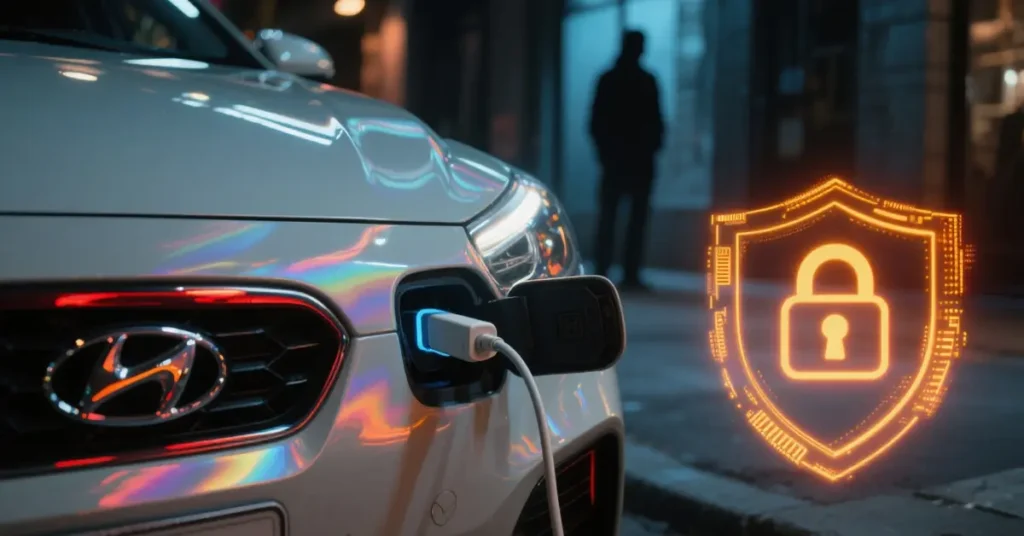Hyundai and Kia owners have found themselves in an automotive horror story cars that could be stolen using nothing more than a USB cable. Viral videos amplified the risk, and suddenly a generation of vehicles became magnets for criminals. The good news? A software remedy has slashed thefts by over half. The bad news? Many cars are still exposed, and broken windows are on the rise. Let’s unpack how far we’ve come and how far we still need to go.
1. How TikTok Stole Our Cars
Overview: What began as daring internet content quickly turned into a real-world epidemic.
- Around 2021–22, videos circulated revealing that Hyundai and Kia models (2011–2021 with keyed ignitions) lacked electronic immobilizers.
- These weaknesses made them prime targets cars could be hot-wired with USB cables or pliers.
- Cities like Milwaukee and St. Louis saw massive surges in theft, prompting lawsuits, insurance red flags, and public outrage. (Kia Challenge – Wikipedia)
2. Software to the Rescue (With Caveats)
Overview: The tech fix seems simple but it doesn’t reach every car.
- Starting in February 2023, Hyundai and Kia began offering a free software patch that functions like a retrofitted immobilizer: the car will only start with a fob.
- By mid-2023, roughly 30% of eligible vehicles had installed it; by mid-2024, that number grew to around 60%.
- Unfortunately, some older models don’t have the necessary hardware those owners were offered steering wheel lock reimbursements. (IIHS / HLDI Report)
3. The Data Speaks: Theft Rates Halved
Overview: Insurance claim metrics show real impact when the software is applied.
- HLDI data revealed a 53% drop in overall theft claims and a 64% reduction in whole-vehicle theft for cars with the upgrade.
- Still, theft frequencies remain significantly higher for Hyundai and Kia compared to other makes.
- Vandalism, not theft, is increasing likely due to frustrated thieves trying (and failing) to break in.
4. Vandalism The New Battlefront
Overview: The fight moved from theft to vandalism but the scars can still hurt the wallet.
- HLDI documented a spike in vandalism claims glass smashed, ignitions ruined, steering columns bent.
- Repairs often cost nearly as much as total replacements would have in the past, blurring the saved-loss narrative.
- These attacks may signal a rise in opportunistic theft attempts rather than organized crime.
5. Still Too Many Cars Left at Risk
Overview: The upgrade is effective but not yet ubiquitous.
- As of late 2024, only 40–41% of eligible Hyundais and Kias had the software installed.
- Theft claims frequencies remain stubbornly high 10–11 per 1,000 insured vehicle years for 2011–2022 models vs. less than 2 for other brands.
- In many regions, these cars continue to top stolen-vehicle lists in 2023, the Hyundai Elantra, Sonata, and Kia Optima were among the most stolen cars. (CarTea News)
6. What Drivers Can Do Right Now
Overview: No magic bullet just smart, layered protection.
- Confirm your vehicle’s eligibility and visit your dealer to install the anti-theft software if available.
- Always lock your car using the key fob not the manual switch to activate the immobilizer.
- Consider physical deterrents like steering wheel clubs, parking in busy, well-lit areas, or installing GPS trackers.
- The goal: make your vehicle the least appealing option on the street.
Hyundai and Kia Step Up Security with Software Upgrades and Extra Protections
As of now, roughly six out of ten eligible Hyundai vehicles have received the anti-theft software upgrade, according to the company. However, not every at-risk Hyundai and Kia can actually support the update some older models simply lack the hardware needed to run it. For those vehicles, the automakers have been handing out free steering wheel locks, giving owners at least a physical layer of protection when the software fix isn’t an option. Even though the Kia crisis is most prominent in the U.S., the lesson resonates in Dubai and across the UAE: auto security matters. Hyundai and Kia vehicle owners in our region especially those with 2011–2022 models should contact retailers about the anti-theft software upgrade. Pairing digital safeguards with physical tools like steering wheel locks and secure parking can make the difference between keeping your ride and losing
Closing Thoughts
Hyundai and Kia’s free anti-theft software has made a real dent in a bizarre, tech-fueled theft wave slashing theft rates and making headlines. But where software stops, physical security must pick up. As car theft prevention evolves to include smart patching and old-school deterrents, the journey toward truly secure streets is ongoing and it starts with informed, proactive owners.
At MotorHub, we understand how crucial vehicle security is for drivers across the UAE. While Hyundai and Kia’s software upgrades have significantly reduced theft risks, many vehicles remain vulnerable especially older models without the necessary hardware. We encourage all Hyundai and Kia owners in the region to consult their dealers about available anti-theft software updates and to invest in physical security measures like steering wheel locks and GPS tracking. MotorHub is here to support you with expert advice, quality accessories, and reliable service to keep your vehicle safe and secure on UAE roads.


